外研版高中英语选修八Module 6《The great influence of Chinese》课件
外研版英语选修八module6原文

【MODULE 6】The Tang Poems【READING AND VOCABULARY】略【READING AND WRITING】The Power of PoetryReading and writing poetry is a very personal experience. Poets use language as a way of expressing their feelings, whether positive ones of love, happiness and hope, or negative feelings like anger and fear. Poems can describe the beauty of nature, a person, a dream or a memorable event. Most people have tried writing poetry at some time, for example at school. For children, it is a good way to explore language and have fun with words as well as to express themselves.But teachers and psychologists have found another use for poetry as a form of therapy to help people with problems. There are benefits for people of all different backgrounds and aged. Writing poetry can help people deal with changes in their lives, death or feelings of sadness, drug or alcohol problems or serious illness. By writing down your feelings, you can learn to understand yourself better and give yourself a voice if you feel you are being ignored. A poem might be a way of telling someone something when you do not feel able to talk about it face to face. And just because people are ill or having difficulties in their lives, it doesn`t mean they have lost their sense of humour. Poems written as therapy can be funny too, as laughter is also considered to be very good medicine.Students at a special school in Dudley, in England, read and write poems every day. Some of the poems they write are very good, but their reason for writing is not just to be creative. All of them have problems. Some of them have long-term medical conditions, such as cancer, while others have personality disorders or psychological problems. By writing poems students are growing in self-confidence. The poem provide a channel through which they can communicate with the world, and express their feelings. They also help them to recognize a positive attitude to life.But the poems are helping other people, too. The school has collected some of the students` poems and published them in a book which is being sold to raise funds for a local hospital. The book has proved very popular, giving students a sense of motivation and achievement.【READING PRACTICE】Poems on the UndergroundAnyone who is addicted to reading bus tickets or cereal packets will understand the appeal of Poems on the Underground. Some years ago, a few London, who used the Tube and loved poetry, decided that it would be pleasant to read a few lines by Tube, instead of just glancing upwards at the tiresome advertisements. The Underground had a surplus of advertising space on the trains. They suggested filling the blank spaces with poems, for the entertainment of the travelling public.London Underground approved of the idea, and once sponsors had been found to pay the expenses for half the spaces, they agreed to pay for the other half. So, in January 1986,Poems on the Underground was officially launched at Aldwych station, in the centre of London. Many of those who left the morning daylight and the damp streets above, and descended through the ticket barriers to the shabby old Underground platform saw theusual signs——TICKETS AND TRAINS, THIS WAY DOEN, CAUTION! DON`T CLIMB ONTO THE LINES, STAND CLEAR, DOORS CLOSING——assume a special literary significance. There was coffee, doughnuts, and wine too, served on the benches where they would usually sit and wait. When the train with a preview of the first poems arrived, everyone got on and within minutes of its departure, the carriages were merry with a chorus of voices reading verse by Shelley, Burns and of course, by themselves.The poems took on a new life when they were removed from books and placed alongside the adverts. Commuters enjoyed the idea of reading Keats` Much have I travel`d` in the realms of gold on a crowded Central Line train, or trying to learn by heart a sonnet between Hammersmith and Piccadilly. The choice of poems wasn`t arbitrary but specially chosen. It catered for all tastes and included living and dead poems from the homeland and from allover the English-speaking world, and especially poems which have associations with London.The success of the Poems on the Underground enterprise confirmed that Britain was a nation of poetry lovers. Hundreds of people corresponded with London Underground suggesting poems, or just to say thank you. In January 1989, on the third anniversary after the first poems on the Underground, London Underground promised to donate all the spaces free, to increase the number available (at least one poem in each train carriage), and to pay for the production costs as well. They also update the poems very few months. Posters of the poems decorate the British Council libraries throughout the world, but the best way to view the poems is to see them yourself, on whichever train you choose, in every zone of the network——for the price of an underground ticket.【CULTURAL CORNER】The Golden Age of English PoetryLike China, Britain had a golden age of poetry——but it came a thousand years after the time of Li Bai and Du Fu. It was a time of revolution and new ideas in Europe. The English Romantic poets, as they are now known, were very interested in what was happening in the rest of the continent.Wordsworth went to France to support the people`s revolution, while Byron died fighting for the independence of Greece against the Turks.But the Romantic poets were more interested in the individual, and in the power of the imagination than they were in politics. They produced wonderful images to express human emotions and to paint pictures of the natural world. They also got inspiration from the myths of past ages, especially the Greek myths, and from their own experiences of love. Typically, the Romantic poets lived hard and died young. Byron was the most famous of them; he travelled a lot and shocked people with his wild behaviour. Another Romantic poet, Coleridge, was probably a drug addict, and the strange journeys of his mind are reflected in his poems. Wordsworth was the only one who lived to old age. As he grew older he became lessinterested in political ideas. He went to live in the Lake District, in the north of England, where he wrote the poem I Wandered Lonely as a Cloud.The most brilliant of the Romantics was probably Keats. Although he studied as a surgeon, poetry was his great love. But when he was just 24 he became very ill. He knew he was going to die, and went to Italy to spend his last months in a more pleasant climate. His friend Shelley,(whose wife Mary wrote Frankenstein), went to Italy to meet him and say goodbye, but he arrived too late. Shelley himself did not live much longer. He drowned in a boating accident off Italy the next year. In his pocket he had a book of Keats` poems.。
外研版英语选修8module6课文翻译
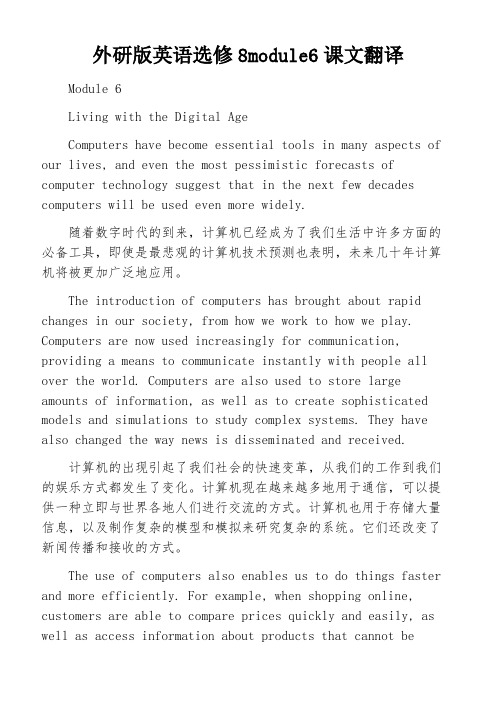
外研版英语选修8module6课文翻译Module 6Living with the Digital AgeComputers have become essential tools in many aspects of our lives, and even the most pessimistic forecasts of computer technology suggest that in the next few decades computers will be used even more widely.随着数字时代的到来,计算机已经成为了我们生活中许多方面的必备工具,即使是最悲观的计算机技术预测也表明,未来几十年计算机将被更加广泛地应用。
The introduction of computers has brought about rapid changes in our society, from how we work to how we play. Computers are now used increasingly for communication, providing a means to communicate instantly with people all over the world. Computers are also used to store large amounts of information, as well as to create sophisticated models and simulations to study complex systems. They have also changed the way news is disseminated and received.计算机的出现引起了我们社会的快速变革,从我们的工作到我们的娱乐方式都发生了变化。
外研社选修八 module6原文

The Golden Age Of Chinese Poetry1_______________________________The Tang Dynasty (618-907) was one of the great dynasties in Chinese history. It was a time of ex pansion. At its high point, the country reached as far as Siberia (now part of Russia) in the north, Korea in the east and Vietnam in the south. The Tang rulers also controlled the trade route known as the Silk Road well into present-day Afghanistan.2_______________________________Trade with foreign countries created a tolerant and cosmopolitan culture. Persians, Arabs and Jews came to live in Chinese towns, bringing with them their own religions and customs. They were all owed to live in communities governed by their own laws, and to keep their traditional forms of ent ertainment such as music and dance, which influenced the development of Tang culture. But perha ps the biggest foreign influence came from Buddhism, whose origins were in India. At the same ti me foreigners who were educated at the Tang court took the Chinese culture home with them. Soo n Japan and Korea were organised on the Tang model, while Chinese influence extended througho ut Southeast Asia.3_______________________________Cultural development went hand in hand with technological progress. New discoveries were made in astronomy, geography and medicine. In 724 Seng Yixing measured the length of the sun’s shadow and the altitude of the North Pole. Under Emperor Taizong (627~649) the government opened medical schools where specialist subjects were studied. The inventio n of printing about this time meant that knowledge could be recorded and shared as never before. But it was not just scientific knowledge that could now reach a wider audience. Printing also mark ed the beginning of the golden age of literature-and literature, in the Tang Dynasty, meant poetry.4_______________________________In the beauty of its images and the range of topics, Tang poetry was better than everything that had come before it. But how did this happen? There is no single answer to the question. An explosion of talent, and the appearance of new forms were both important. In the “New Style Verse" which appeared during the Tang period, each line has five or seven syllables, and there are lots of rules which govern the tones.But being able to write poetry was also an important qualification for people who wanted to beco me government officials. A good poet had a better chance of getting a good job. So lots of people became interested in poetry.5______________________________One of the greatest of the Tang poets was Du Fu (712~770). As a young man he travelled a lot and enjoyed painting and music, as well as writing poetry. But during his lifetime he never became famous; in fact, he thought of himself as a failure. It was only in the 11th century that his poetic genius was recognised. Sometimes he is called the “poet o f history” or “the mirror of his time” because he paints a realistic picture of the problems of t he age in which he lived These include the sufferings of the poor, and the corruption of the rich. H e also writes about his own problems, including his son's death. Du Fu is also known for his friend ship with Li Bai (701~762), another great poet of the age. The two men met in 744, and although very different, they bec ame friends. They each wrote poems to the other.6______________________________Li Bai, the son of a wealthy merchant, grew up in Sichuan was not so successful as some of the ot her young men of his time in the Civil Service Examination to become a government official, he b egan a life of travel and poetry, writing more than a thousand poems. He used simple, direct langu age and often chose irregular forms. If Du Fu was realist, then Li Bai was a romantic. He wrote ab out nature and people with the same depth of feeling Friendship, the human condition, and the ple asures of wine, are his favourite subjects. It is said that he drowned when he fell into a river while trying to take hold of the reflection of the Moon.The Power of PoetryReading and writing poetry is a very personal experience. Poets use language as a way of expressi ng their feelings, whether positive ones of love, happiness and hope, or negative feelings like ange r and fear. Poems can describe the beauty of nature, a person, a dream or a memorable event. Most people have tried writing poetry at some time, for example at school. For children, it is a good wa y to explore language and have fun with words as well as to express themselves.Bui teachers and psychologists have found another use for poetry as a form of therapy to help peo ple with problems. There are benefits for people of all differentbackgrounds and ages. Writing poe try can help people deal with changes in their lives, death or feelings of sadness, drug or alcohol pr oblems or serious illness. By writing down your feelings, you can learn to understand yourself bett er and give yourself a voice if you feel you are being ignored. A poem might be a way of telling so meone something when you do not feel able to talk about it face to face. And just because people a re ill or having difficulties in their lives, it doesn’t mean they have lost their sense of humour. Poems written as therapy can be funny too. as laughte r is also considered to be very good medicine.Students at a special school in Dudley, in England, read and write poems every day. Some of the p oems they write are very good, but their reason for writing is not just to be creative. All of them ha ve problems. Some of them have long-term medical conditions, such as cancer, while others have personality disorders or psychological problems. By writing poems students are growing in self-co nfidence. The poems provide a channel through which they can communicate with the world, and express their feelings. They also help them to recognise and explore their problems and to develop a positive attitude to life.But the poems are helping other people, too. The school has collected some of the students’poems and published them in a book which is being sold to raise funds for a local hospital. The bo ok has proved very popular, giving students a sense of motivation and achievement.Poems on the undergroundAnyone who is addicted to reading bus tickets or cereal packets will understand the appeal of Poe ms on the Underground. Some years ago, a few acquaintances who lived and worked in London, who used the Tube and loved poetry, decided that it would be pleasant to read a few lines by their favourite poets as they travelled around by Tube, instead of just glancing upwards at the tiresome advenisements. The Underground had a surplus of advertising space on the trains. They suggested filling the blank spaces with poems, for the entertainment of the travelling public.London Underground approved of the idea, and once sponsors had been found to pay the expenses for half the spaces, they agreed to pay for the other half. So, in January 1986, Poems on the Under ground was officially launched at Aldwych station, in the centre of London. Many of those who le ft the morning daylight and the damp streets above, and descended through the ticket barriers to th e shabby old Underground platform saw the usual signs-TICKETS AND TRAINS, THIS WAY DOWN,CAUTION! DON’T CLIMB ONTO THE LINES,STAND CLEAR, DOORS CLOSING - assume a special literar y significance. There was coffee, doughnuts, and wine too, served on the benches where they woul d usually sit and wait. When the train with a preview of the first poems arrived, everyone got on a nd within minutes of its departure, the carriages were merry with a chorus of voices reading verse by Shelley, Burns and of course, by themselves.The poems look on a new life when they were removed from books and placed alongside the adve rts. Commuters enjoyed the idea of reading Keats’Much have I travell’d in the realms of gold on a crowded Central Line train, or trying to learn by heart a sonnet betw een Hammersmith and Piccadilly. The choice of poems wasn’t arbitrary but specially chosen, It catered for all tastes and included living and dead poems from t he homeland and from all over the English- speaking world, and especially poems which have ass ociations with London.The success of the Poems on the Underground enterprise confirmed that Britain was a nation of po etry lovers. Hundreds of people corresponded with London Underground suggesting poems, or jus t to say thank you. In January 1989, on the third anniversary after the first poems on the Undergro und, London Underground promised to donate all the spaces free, to increase the number available (at least one poem in each train carriage), and to pay for the production costs as well. They also u pdate the poems every few months. Posters of the poems decorate the British Council library throu ghout the world, but the best way to visit the poems is to see them yourself, on which the train yo u choose, in every zone of the network for the price of an underground ticket.The Golden Age Of English PoetryLike China, Britain had a golden age of poetry-but it came a thousand years after the time of Li Bai and Du Fu. It was a time of revolution and ne w ideas in Europe. The English Romantic poets, as they are now known, were very interested in w hat was happening in the rest of the continent.Wordsworth went to France to support the people’s revolution, while Byron died fighting for the independence of Greece against the Turks.But the Romantic poets were more interested in the individual, and in the power of the imaginatio n than they were in politics. They produced wonderful images to express human emotions and to p aint pictures of the natural world. They also got inspiration from the myths of past ages, especially the Greek myths, and from their own experiences of love.Typically, the Romantic poets lived hard and died young. Byron was the most famous of them; he travelled a lot and shocked people with his wild behaviour. Another Romantic poet, Coleridge, wa s probably a drug addict, and the strange journeys of his mind are reflected in his poems. Wordswo rth was the only one who lived to old age. As he grew older he became less interested in political i deas. He went to live in the Lake District, in the north of England, where he wrote the poem I Wan dered Lonely as a Cloud.The most brilliant of the Romantics was probably Keats. Although he studied as a surgeon, poetry was his great love. But when he was just 24 he became very ill. He knew he was going to die, and went to Italy to spend his last months in a more pleasant climate. His friend Shelley, (whose wife Mary wrote Frankenstein), went to Italy to meet him and say goodbye, but he arrived too late. Shel ley himself did not live much longer. He drowned in a boating accident off the west coast of Italy t he next year. In his pocket he had a book of Keats' poems.Young man who never grew oldFrom 1914 to 1918,The First World War took place in Europe and all over the world. Millions of y oung men died in the fighting, the worst of which took place in Northern France. But these four ye ars of suffering and death also produced some wonderful poems. Two of the most famous of the E nglish “First World War Poets”,as they are known, are Rupert Brooke and Wilfred Owen. Theirpoems reflect their horror of war and the waste of young lives.Rupert Brooke was born in 1887. He loved the English countryside and his early poems about Eng lish country life are romantic and full of images of nature. These poems were published in 1911. When war broke out on 4th August, 1914, Brooke went to sea to fight for Britain. At the beginning of the war, the government said that it was “the war to end all wars” and that it would be “all over by Christmas”. This meant that the war should have been quick and not too terrible. Brooke’s poemsreflected the sad but optimistic mood of many people in 1914. In 1915 he was on a ship sa iling to Turkey -but he never arrived, He became ill and died, aged 28. The poem for which he is best remembered is called The Soldier which begins with these famous lines:If I should die, think only this of me: That there’s some corner of a foreign field That is forever England.Wilfred Owen, born in 1893,joined the army in 1915. His poems describe the physical suffering of men in the “trenches”- deep paths in the fields in France where the soldiers had to live. He b elieved that war was sometimes necessary, but was also very cruel and he questioned why so man y soldiers had to die. About his poetry Wilfred Owen wrote:“My subject is war, and the pity of war. The poetry is in the pity.”His poems also reflect the mood of anger among many people at the government’s failure to end of the terrible suffering this long war had brought. Bells were ringing to celebrate t he end of the war, on 11th November,1918, when a telegram was brought to Owen’s parents’ house. It gave them the news that their son had been killed in the fighting. That day w as 4th November,1918. If the war had ended just one week earlier, the young man who became on e of England’s most famous poets, Wilfred Owen, might have lived to write for many more years.。
外研版高二英语选修8_外研版高二英语选修8_Module6_Grammar精品课件

May和might的用法
1. may, might 表示推测“可能性”时,意思是“可 能”、“也许”, 语气上不是太肯定。
※ He may / might be in his office now. = It is possible that he is in his office.
※ She would not go to the dentist even though she was in considerable pain.(意愿)
※ When my parents were away, my grand mother would look after me. (习惯性)
after his death.
※ 情态动词+have +过去分词用来表示对发生在过 去的事情的推测。
情态动词表推测的用法:
※ 情态动词中的must, can, could, may, might 都可以用 来表推测。
※ 在肯定句中,must 的可能性最大,can / could 次之, may / might最小。
Must表示推测时的用法
4、在含有must的反意疑问句中,疑问部分的助动 词根据实际情况而定:
※ He must be an actor, isn’t he? (表现在 )他一定是个演员,对吗? ※ She must have met a fairy, hasn’t she?
(表完成)她一定遇到仙女了,是吗? ※ It must have rained last night, didn’t it?
※ The boys shouldn’t be playing football at this time. They should be at school. 孩子们这个时候不该在踢足球,他们应该在学校上 学。(表可能性)
英语新同步外研选修八课件:Module 6 单元小结
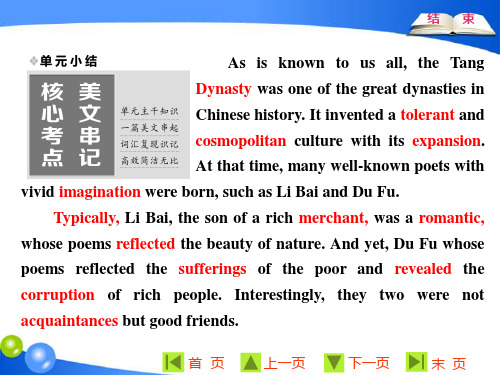
首页
上一页
下一页
末页
结束
“单元加餐练”见“Module 6 单元加餐练(一~二)” (单击进入电子文档)
“高考提能练”见“Modules 5~6高考提能练” (单击进入电子文档)
“高考提能练”见“模块综合” (单击进入电子文档)
首页
有的商人的儿子,是浪漫主 义诗人,他的诗反映了自然的美丽。而杜甫的诗反映了穷人的 苦难,揭露了富人的腐败。有趣的是,李白和杜甫不是泛泛之 交而是很好的朋友。
首页
上一页
下一页
末页
结束
并且这两个诗人抓住每一次机会来分享彼此的作品。在 他们分开后,他们还总是相互通信以寻求心灵上的抚慰。
In China, almost everyone is familiar with Li Bai and Du Fu, who are regarded as not failures but great successes in literature realm.
首页
上一页
下一页
末页
结束
正如我们都知道的,唐朝是中国历史上最伟大的朝代之一。 随着唐朝势力的扩张,它创造了宽容和包罗万象的文化。当时, 诞生了许多著名的富有想象力的诗人,比如李白和杜甫。
结束
As is known to us all, the Tang Dynasty was one of the great dynasties in Chinese history. It invented a tolerant and cosmopolitan culture with its expansion. At that time, many well-known poets with vivid imagination were born, such as Li Bai and Du Fu. Typically, Li Bai, the son of a rich merchant, was a romantic, whose poems reflected the beauty of nature. And yet, Du Fu whose poems reflected the sufferings of the poor and revealed the corruption of rich people. Interestingly, they two were not acquaintances but good friends.
高中英语外研版选修八Module 6 Grammar课件(33张)
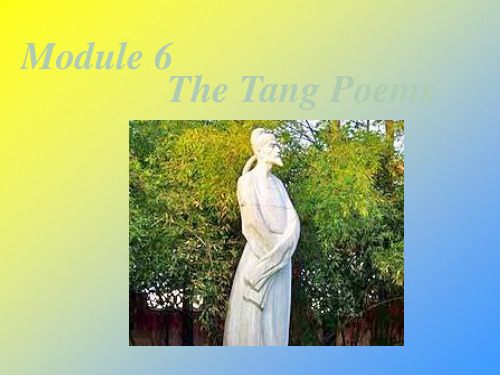
1) must在肯定句中表示较有把握的推测.“肯定,必 定,一定…..” 2) “must +动词原形” 表示对现在的状态和事情 的推测,如: You have worked hard all day. You must be tired. He always studies English. He must like English. 3) must be doing 表示对现在正发生的事情的推测, 如: He must be playing basketball on the playground. 4) 表示对已发生的事情的推测时,must 要接完成式。 即:must +have +done I didn't hear the phone. I must have been asleep.
情的推测,如:
He can be playing basketball on the
playground.
can / could表推测的用法:
4)can + have done,表示对过去发生的动作进 行推测。
He can have gone to Shanghai . 他可能去上海了。
It’s so late. Where can she have gone? 天晚了,她可能去哪儿了呢? 5)could 表示比can更委婉的语气(不表示过去
plete the sentences with must , can’t,
and may/might.
1 We __m_a_y_/_m_i_g_h_t_ study English poetry next year. I am not sure yet.
高考英语外研版:选修8+Module+6+The+Tang+Poems
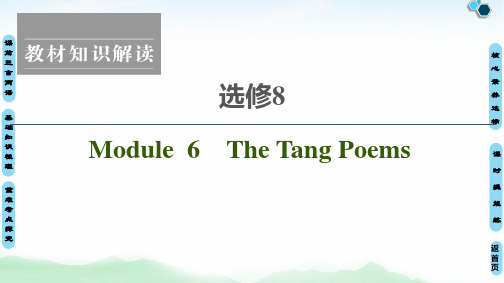
核 心
两
素
语
2.astronomy n._天__文__学__
养
达
基 础
3.altitude n._高__度__;__海__拔__
标
知
识 梳
4.suffering n._(肉__体__或__精__神__上__的__)_痛__苦__;__苦__难____
课
理
时
5.corruption n._腐__败__;__堕__落___
标
知
识 梳
enjoy moon cakes.
课
理
2.(2017·全国卷Ⅱ)Through the years, I'd run into former students 时
重
提
难 考
who would provide _u_p_d_at_e_s_(update) on old classmates.
养
达
基 础
2.(2018·全国卷Ⅲ)The post has since gained the attention of
标
知
识 social media users all over the world, receiving more than 184,000
梳
课
理 shares and 61,500 likes in just three days._份___
能
点
练
探
究
返
首
页
课
前 三 言
3.There have been great _a_d_v_an_c_e_s_(advance) in medicine in the last
核 心
高中英语(外研社)第八册(选修8)(Module 6)电子课本
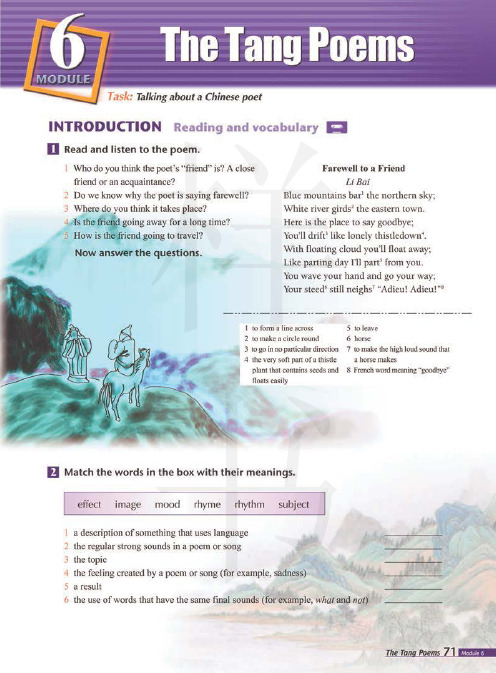
ITadiúonal forms ofemertainmem such 描 music meant poelry.
E and dance, whicb influenced the developmenl
ofTang culture. BUI perbaps\1四 biggesl foreign ln Ihe beauly or ilS images and the range or
6 the use of words that have the same final sounds (for example, what and 1I0t)
加 1Dna po棚恬 71 Modo'<6
回 Work in pairs and answer the questions.
I Whal is Ihe subjecl oflhe poem? 2 Whal is the mood oflhe poem? 3 Which images 齿。m nature does Ihe poel use? 4 What is Ihe effect of the change in lense in Line 7? 5 ldeOlify Ihe rhymes in 由epoem. 6 Underline the words or parts of 由e words which create the rh严hm.
are 10臼。r rules which govern the 101飞.es. BUl 明白Li Bai (701-762), anothcr gr回1 poCI of 山e
being able 10 wrile poetry w臼 a1ωan imponam age. Thc two men mel in 744, and allhough very
module6高中英语外研版选修八
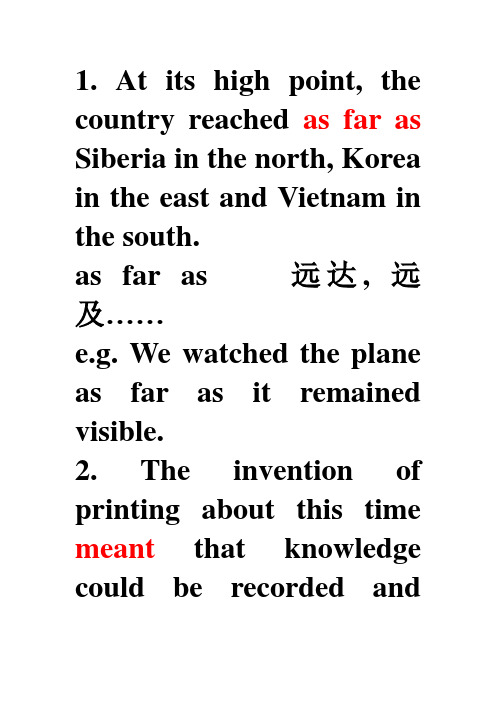
1. At its high point, the country reached as far as Siberia in the north, Korea in the east and Vietnam in the south.as far as 远达, 远及……e.g. We watched the plane as far as it remained visible.2. The invention of printing about this time meant that knowledge could be recorded andshared as never before.1)打算, 企图(+to do sth.)e.g. You don’t mean to say so!2)意味着(+doing sth.)e.g. But independence does notmean shutting the door on theworld.3. But during his lifetime he never became famous; in fact he thought of himself as a failure.teacherthink of 认为,评价e.g. The students think highly of their new English teacher.4. It was only in the 11th century that his poetic genius was recognized.It is/was…是强调句型, 被强调部分是后面的: only in the 11th century5. It is said that he drowned when he fell into a river while(he was)trying to take hold of the reflection of the Moon.从句while trying to take hold of…中while后省略了he was1. Poets use language as a way of expressing their feelings, whether positive ones of love, happiness and hope, or negative feelings like anger and fear. whether 引导状语从句e.g. Whether this is true (or not), I can’ttell.We haven’t decided whether to sail or fly to Qingdao.I shall start tomorrow, whether he asks me or not. Well, that depends on whether we carry out the policy correctly.. By writing poems students are growing in self-confidence.by prep.以(做某事)的行动(+doingsth.)e.g. Let me start by saying congratulations.3. The poems provide a channel through which they can communicate with the world, and express their feelings. through which… 介词提前的定语从句除此之外还有:to/of/by/with /without which/whom…e.g. There are severalnovels of which Oliver Twist is the best one that I have ever read.Oxygen is an important element without which we can not live.Do you know the artist to whom the judge gave a prize?4. The school has collected some of the students’ poems and published them in a book which is being sold to raise funds for alocal hospital.raise v.筹措, 募集e.g. They were raising money for a new undertaking1. London Underground approved of the idea, and once sponsors had been found to pay the expenses for half the spaces…approve of sth. 赞成, 同意e.g. Her father will never approve of her marriage toyou.I can’t sup port a policy of which I have never approve.They took on a new life when they were removed from books and …take on 开始具有, 呈现e.g. Now her hair has taken on a healthy shine. His writing has taken on a very peculiar style.. It catered for all tastes and included living anddead poems from the homeland and from all over the English-speaking world, and especially poems which have associations with London. association n.联系, 关系e.g. I benefited much from my association with him. The salesman’s associat ion with the firm lasted 32 years.4. He drowned in aboating accident off the west coast of Italy the next year.off prep.离……一些距离e.g. a house off the main roadan island off the coast。
外研版高中英语选修8 Module6教案Module 6 辅导1
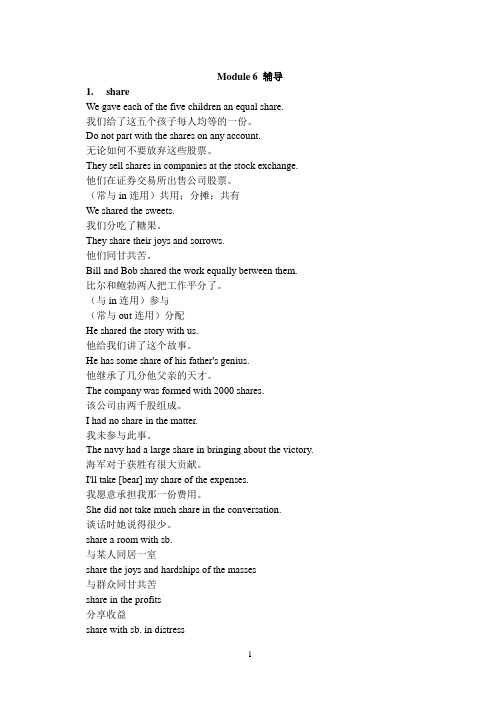
Module 6 辅导1.shareWe gave each of the five children an equal share.我们给了这五个孩子每人均等的一份。
Do not part with the shares on any account.无论如何不要放弃这些股票。
They sell shares in companies at the stock exchange.他们在证券交易所出售公司股票。
(常与in连用)共用;分摊;共有We shared the sweets.我们分吃了糖果。
They share their joys and sorrows.他们同甘共苦。
Bill and Bob shared the work equally between them.比尔和鲍勃两人把工作平分了。
(与in连用)参与(常与out连用)分配He shared the story with us.他给我们讲了这个故事。
He has some share of his father's genius.他继承了几分他父亲的天才。
The company was formed with 2000 shares.该公司由两千股组成。
I had no share in the matter.我未参与此事。
The navy had a large share in bringing about the victory. 海军对于获胜有很大贡献。
I'll take [bear] my share of the expenses.我愿意承担我那一份费用。
She did not take much share in the conversation.谈话时她说得很少。
share a room with sb.与某人同居一室share the joys and hardships of the masses与群众同甘共苦share in the profits分享收益share with sb. in distress与某人共患难2.advanceThe troops advanced.部队向前开进。
2020高考英语外研版教材知识梳理:选修八 Module 6(39ppt)
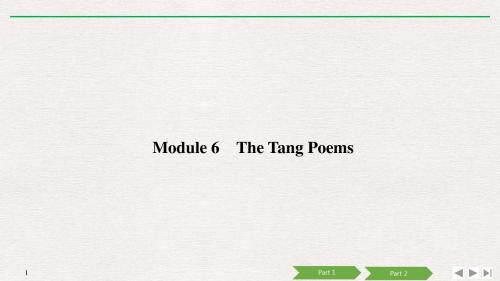
5
Part 1
Part 2
『联想记忆』
1.“看”之种种
①glance v. (粗略地)看一下;扫视 n. 一瞥;扫视 ②glare v. 瞪眼;怒目而视 ③watch v. 看;注视 ④witness v. 目击 n. 目击者 ⑤stare vt.& vi. 凝视;盯着看
8
Part 1
Part 2
4.以ist为后缀的高频名词全接触 ①specialist 专家 ②journalist 记者 ③psychologist 心理学家 ④economist 经济学家 ⑤agriculturist 农学家 ⑥biologist 生物学家 ⑦futurologist 未来学家 ⑧zoologist 动物学家
3
Part 1
Part 2
Ⅱ.词性转换与派生记忆
1.glance v.一瞥;迅速看一眼→n.匆匆一看;一瞥;扫视 2.shadow n.影子,阴影→v.跟踪;盯梢;在……上投下(或覆盖)阴影 3.share v.分享,共享→n.(在若干人之间分得的)一份 4.damp adj.潮湿的→n.潮湿;潮气 5.approve vi.赞成;同意 vt.批准;通过→approval n.赞成;同意 6.prove v.证明是;被发现是→proof n.证据 7.donate v.提供;捐→donation n.捐献 8.tolerant adj.宽容的;容忍的→tolerance n.宽容,忍耐→tolerate v.容忍;宽容;忍受
13
Part 1
Part 2
7.help people with problems 帮助有问题的人 8.different backgrounds and ages 不同背景和年龄 9.changes in their lives 他们生活的改变 10.learn to understand yourself better 学会更好地理解自己 11.grow in self-confidence 增强自信 12.develop a positive attitude to life 养成对生活的积极态度
高二外研版选修八备课资料:module_6_教案_the_fifth_period_extensive_reading
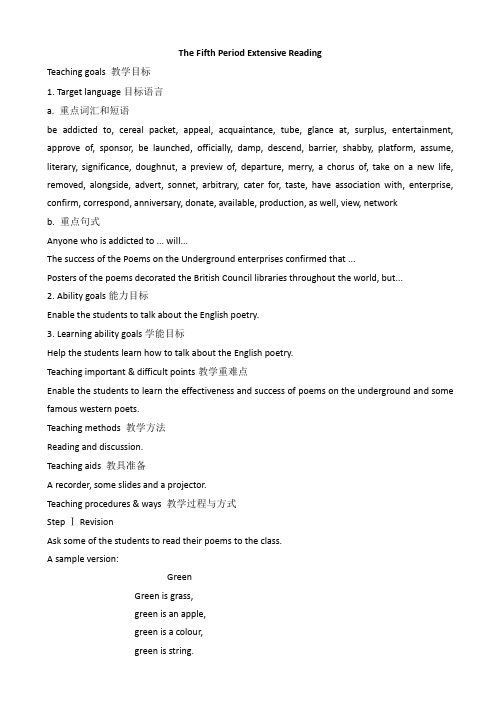
The Fifth Period Extensive ReadingTeaching goals 教学目标1. Target language目标语言a. 重点词汇和短语be addicted to, cereal packet, appeal, acquaintance, tube, glance at, surplus, entertainment, approve of, sponsor, be launched, officially, damp, descend, barrier, shabby, platform, assume, literary, significance, doughnut, a preview of, departure, merry, a chorus of, take on a new life, removed, alongside, advert, sonnet, arbitrary, cater for, taste, have association with, enterprise, confirm, correspond, anniversary, donate, available, production, as well, view, networkb. 重点句式Anyone who is addicted to ... will...The success of the Poems on the Underground enterprises confirmed that ...Posters of the poems decorated the British Council libraries throughout the world, but...2. Ability goals能力目标Enable the students to talk about the English poetry.3. Learning ability goals学能目标Help the students learn how to talk about the English poetry.Teaching important & difficult points教学重难点Enable the students to learn the effectiveness and success of poems on the underground and some famous western poets.Teaching methods 教学方法Reading and discussion.Teaching aids 教具准备A recorder, some slides and a projector.Teaching procedures & ways 教学过程与方式Step Ⅰ RevisionAsk some of the students to read their poems to the class.A sample version:GreenGreen is grass,green is an apple,green is a colour,green is string.Step Ⅱ ReadingLead-inT: Where do you think you can read poems?S: Generally speaking, we can read poems in books.T: But have you heard that poems can appear on the carriage of a train? Today we will read the following passage with the title “Poems on the Underground”. After you read it, please do Activities 1 and 2.SkimmingT: I think you must have finished reading the passage. Let’s first deal with Activity 1. Look at the title and some words and phrases from the passage. What do you think the Underground refers to? S: I think here the Underground refers to a railway system under the ground.T: Yes, you are right. Now let’s check the answers to Activity 2.After a few minutes.T: You’ve done a good job. Please listen to the tape and try to understand the passage further. Then I will ask you some more questions about it.ScanningT: Now read the passage again, and then do Activities 3 and 4. I’ll give you a few minutes.A few minutes later.T: Have you finished? Let’s check the answer to Activity 3. Any volunteer?S: I think the correct answer is a, because in the writer’s opinion, this is a good way to read poetry cheaply and it is a success.T: Now go on with Activity 4 and choose the correct answers.Then check the answers.Step Ⅲ DiscussionT: Up to now, I think you have understood the whole passage very well. Now let’s listen to the tape. While listening, please pay attention to the pronunciation and intonation. And after listening, please discuss the sentences in Activity 5 in groups. Of course you can have your own opinion. Then play the tape. After listening, ask some students to say what the writer means by these sentences.T: Now I will check your answers. S1, what do your group think about the first sentence?S1: We think that the carriages with these new signs took on a special literary significance.T: I think so. Now, S2, what do your group think about the second sentence?S2: We think that the passengers were happy with the changes because they liked to read these poems written by famous poets.T: Right. Now S3, what about the third sentence?S3: In our opinion, this sentence means that Keat’s poem suited the atmosphere of riding in the carriage.T: I see, Now S4, what do your group think about the fourth sentence?S4: Our group think that London Underground supported the measure and they went further in this practice.T: Oh, then, S5, how about the last sentence?S5: This sentence shows the writer’s opinion. He thinks that this measure is effective and successful. T: Very good. From your discussion, I can conclude that most of you understand the passage very well. The passage tells us that writing poems on the underground is effective and successful. Step Ⅳ WritingT: Now that we have read the passage carefully, please write short answers to the questions in Activity 6.Suggested answers:1. Some years ago, the life for commuters in London was not very good. They had to get on the crowded carriages and do nothing. But now some changes have taken place to them. On the walls of the carriages there are some poems which were written by Shelly, Keats and some other famous poets. By reading these poems their journey becomes more comfortable and relaxing.2. London Underground also supported the idea.3. I think this idea might work in our own town. I think we should choose Du Fu’s and Li Bai’s poems. If we have to choose anything other than poems, I think we should write sayings and mottos to replace them.T: Good. I will give you 5 minutes to write a short passage about a similar project on transport in your town or region. And then I will ask some of you to read out your passage.Five minutes later, ask some students to read their work.A sample version:Yellow-cap Program in Our CityIn the past the traffic near the primary schools in our city was so heavy that it was a great threat to the life of the students. Nearly every year there are two or three students killed or injured. In order to solve the problem our city has begun a program called Yellow-cap Program. According to the program all the students should wear yellow caps on their way school or back home. Any driverwho sees the students who wear a yellow cap should pay special attention and be more careful. Thanks to this program no student is reported to have been injured or killed since then. I’m sure that this program will be carried on and benefit more students.Step Ⅴ Cultural CornerT: I think that you must know a lot about the Tang poems and foreign poems and now I would like to ask you to know more about English poetry. Please read the passage and answer the questions on Page 83.Give the students three minutes and then check their answers.T: Now I think that you must have finished reading the passage and I want to check your answers. Who would like to tell me your answers?S: Let me have a try. This passage speaks about four poets. They are Wordsworth, Byron, Coleridge and Keats.T: Right. Now the second question.S: Li Bai and Wang Bo are the most romantic Chinese poets.T: OK. Please turn to Page 124 (Workbook) and read another passage entitled Young Men Who Never Grew Old. Then do Activities 9 and 10.A few minutes later.T: Have you finished? Let’s check the answers.Suggested answers to Activity 9:1. They are Rupert Brooke and Wilfred Owen.2. At first his poems were about English country life, romantic and full of images of nature. Later his poems were about wars.3. He was sad but optimistic about the war.4. He thought his country would win the war.5. He believed that war was sometimes necessary, but was also very cruel and he questioned why so many soldiers had to die.6. Because he was killed just one week before the war stopped.7. Yes.8. Du Fu(杜甫)、Lu You (陆游)、Gao Shi(高适) and so on.Step Ⅵ HomeworkT: Now let’s recall what we have learned in this module. We have learned something about Chinese poems and western poems. What’s more, we’ve also learned s omething about Chinese poets and western poets. I hope you will like poetry. After class, please go over the whole module andpreview the next.。
- 1、下载文档前请自行甄别文档内容的完整性,平台不提供额外的编辑、内容补充、找答案等附加服务。
- 2、"仅部分预览"的文档,不可在线预览部分如存在完整性等问题,可反馈申请退款(可完整预览的文档不适用该条件!)。
- 3、如文档侵犯您的权益,请联系客服反馈,我们会尽快为您处理(人工客服工作时间:9:00-18:30)。
•1 •2 . .
One reason... why superpower/ still
school students fluent in Chinese by 2020. • 4) Chinese has become the second most spoken foreign languages
in the USA.
• 5) Many US celebrities study Chinese as a second language. • 6) Donald Trump performed the traditional folk song Jasmine in Mandarin.
that goes to his head. If you talk to him in his own
language, that goes to his heart.
如果你说他听的懂得语言,你会了解他 的思想。如果你用他的母语交谈,你会 深入他的灵魂。
• According to a report published 1 (publish) by the British Council in September, about 51 percent of UK parents want their
make a deal/do business with...
I like this guy ______is who a very far-sighted man. David Cameron
• 4.If you talk to a man in a language he understands,
Task four:Sentence focus
1.In fact, the popularity of Chinese drove the UK government to
launch the Mandarin Excellence Programme in September last
year.(p1)
他的某些所作所为很让我生气。
• 2.So far, 67 countries and regions have included Chinese in
their national curriculum.(p3)
up to now
I have included you in the list of my friends. 把...包含在内
The Great Influence of Chinese
British royal family
•Fast Reading
• Task one: Match the main ideas • Para 1 • • Para 2 People in the USA are showing a growing interest in Chinese. Why are so many countries crazy about
popular (受欢迎) Chinese has become more and more ________.
drive -drove-driven
to start to set up/found
驾驶;驱动, 迫使
eg:There are certain things he does that drive me mad.
• 3.This opinion was share
d
by former prime minister
of the UK David Cameron, who encouraged British students to learn Chinese to “ seal tomorrow ’ s business deals” in 2013.
Donald Trump&# can live on her face , but she must rely on talent.
Task three: Put the sentences back to the article
• A.even if it’s not a superpower like America.
•
• Para 3.4 •
learning Chinese?
People from different classes in the UK are learning Chinese.
Task two:True or False questions
• 1) Only royal family members in the UK want to learn Chinese. • 2) The UK parents believe Chinese is the most useful language to know.
He wasn't alone.
one of the most useful languages secondary school/ middle school
• 3) The program’s aim is to make at least 5,000 British state primary
children to learn Chinese, as it’s believed to be one of the most
Task five: brain storm
languages useful 2 (language) to know. By 2020, at least 5,000 British fluently state secondary school students can speak Chinese
